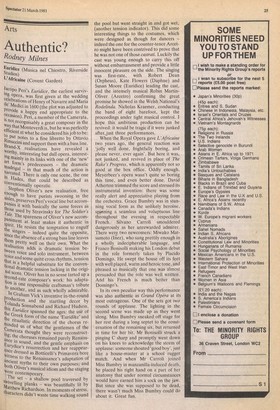Arts
Authentic?
Rodney Milnes
Euridice (Musica nel Chiostro, Riverside Studios) L'Africaine (Covent Garden) Jacopo Peres Euridice, the earliest surviving opera, was first given at the wedding celebrations of Henry of Navarre and Maria de' Medici in 1600 (the plot was adjusted to Provide a happy end appropriate to the occasion). Pen, a member of the Camerata, is not recognisably a great composer in the way that Monteverdi is, but he was perfectly efficient at what he considered his job to be: to put notes to a fine libretto by Ottavio Rinuccini and support them with a bass line. Brand-X realisations have revealed a Worthy, interesting but dull opera, interesting mainly in its links with one of the 'new' art form's predecessors — the dramatic madrigal — in that much of the action is narrated. There is only one scene, the one in Hades, that could be described as conventionally operatic. Stephen Oliver's new realisation, free enough to have purists swooning in the aisles, preserves Pen's vocal line but accomPanies it with basically the same forces as those used by Stravinsky for The Soldier's rale. The spareness of Oliver's new accompaniment atleast makes it authentic in Spirit. He resists the temptation to engulf the singers — indeed quite the opposite, Stnce the absence of a strong bass line leaves them pretty well on their own. What the realisation adds is dramatic tension between voice and solo instrument, between voice and some quite cross rhythms, tension that is a helpful substitute for the conventional dramatic tension lacking in the original score. Oliver has in no sense tarted up a second-rate composer's work: his adaptation is one responsible craftsman's tribute to another, and as such wholly admirable. In Graham Vick's inventive in-the-round Production and the startling decor by Yolanda Sonnabend and Richard Hudson, this Euridice spanned the ages: the use of the Greek form of the name 'Euridike' and the ritualistic direction of the chorus reminded us of what the gentlemen of the Camerata thought they were reconstructing; the choruses remained purely Renaissance in sound, and the gentle emphasis on Eurydice's resurrection and her reappearance dressed as Botticelli's Primavera bore Witness to the Renaissance's adaptation of ancient myths to their own purposes; and both Oliver's musical idiom and the staging Were contemporary, The set — a shallow pool traversed by swivelling planks — was beautifully lit by Matthew Richardson. In moments of stress, characters didn't waste time walking round the pool but went straight in and got wet, (another tension indicator). This did some interesting things to the costumes, which were designed as though for dancers — indeed the one for the counter-tenor Arcetro might have been contrived to prove that he was not one of those cc:strati. Luckily the cast was young enough to carry this off without embarrassment and provide a little innocent pleasure on the side. The singing was first-rate, with Robert Dean (Orpheus), Kate Flowers (Daphne) and Susan Moore (Euridice) leading the cast, and the intensely musical Robin MartinOliver (Arcetro) confirming the great promise he showed in the Welsh National's Rodelinda. Nicholas Kraemer, conducting the band of eight barefoot, kept the proceedings under tight musical control. I hope this ambitious production can be revived: it would be tragic if it were junked afterjust three performances.
When the Royal Opera gave L'Africaine two years ago, the general reaction was 'jolly well done, frightfully boring, and please never, ever again'. But here it was, not junked; and revived in place of The Rake's Progress, which is apparently not so good at the box office. Oddly enough, Meyerbeer's opera wasn't quite so boring this time, and even better done. David Atherton trimmed the score and stressed its instrumental invention: there was some really alert and appreciative playing from the orchestra. Grace Bumbry was in stunning vocal form as the unlikely heroine, *ming a seamless and voluptuous line throughout the evening in respectable French. Silvano Carroli smouldered dangerously as her unrewarded admirer.
There were two newcomers: Miwako Matsumoto (Inez), who sang prettily enough in a wholly indecipherable language, and Franco Bonisolli making his London debut in the role formerly taken by Placido Domingo. He swept the house off its feet with well played, warm and heroic tone, and phrased so musically that one was almost persuaded that the role was well written. And his French is much better than Domingo's.
In its own peculiar way this performance was also authentic as Grand Opera at its most outrageous. One of the sets got two rounds of applause. The lighting in the second scene was made up as they went along. Miss Bumbry sneaked off stage for her rest during a long septet to the const ernation of the remaining six, but returned in time for her bit. Mr Bonisolli struck a pinging C sharp and promptly went down on his knees to acknowledge the storm of applause: someone shouted 'good boy', just like a house-master at a school rugger match. And when Mr Carroll joined Miss Bumbry in manzanilla-induced death, he placed his right hand on a part of her anatomy that under normal circumstances would have earned him a sock on the jaw.
But since she was supposed to be dead, there wasn't much Miss Bumbry could do about it. Great fun.






































 Previous page
Previous page